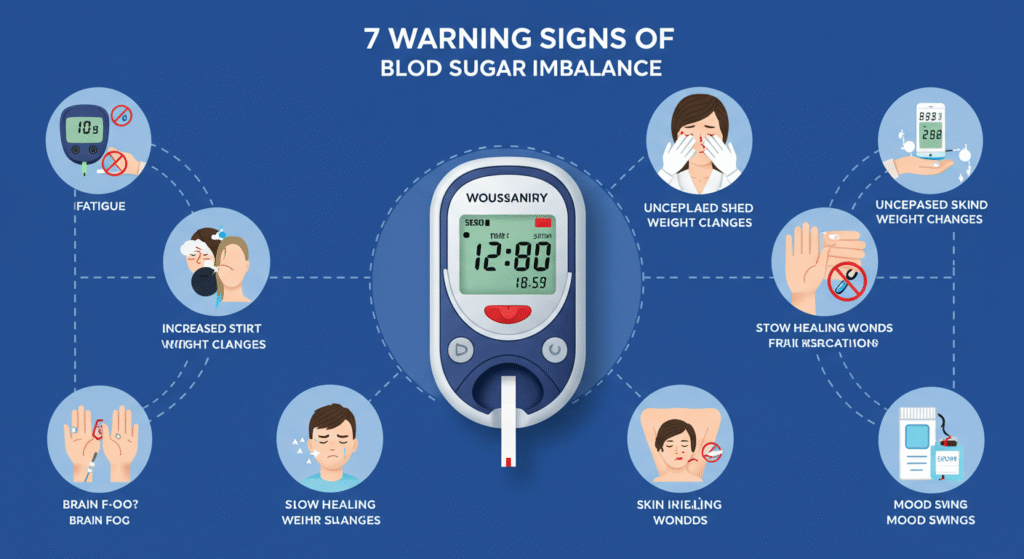Are you experiencing warning signs your blood sugar might be imbalanced without even realizing it? Millions of Americans struggle with blood sugar issues daily, often dismissing crucial warning signs of blood sugar imbalance as simply part of getting older or being stressed.
Recognizing these warning signs early can make all the difference in maintaining your health and preventing more serious complications down the road. The American Diabetes Association’s research shows that identifying warning signs your blood sugar might be imbalanced can lead to early intervention and better outcomes. Click here to discover a natural solution that thousands are using to balance their blood sugar levels.
What Causes Blood Sugar Imbalances? 🔍
Blood sugar imbalances occur when your body struggles to regulate glucose levels effectively. This happens primarily due to:
- Insulin resistance
- Poor dietary choices
- Sedentary lifestyle
- Genetic predisposition
- Certain medications
- Chronic stress
- Inadequate sleep quality
Understanding these root causes is vital because they directly influence how your body processes glucose. When your cells become resistant to insulin or your pancreas can’t produce enough of this crucial hormone, your blood sugar levels fluctuate dangerously.
According to a study published in the Journal of Diabetes Research, nearly 88 million American adults—approximately 1 in 3—have prediabetes, yet 84% don’t know they have it because they miss the warning signs of blood sugar imbalance.
Why Balanced Blood Sugar Matters for Overall Health ❤️
Before diving into the warning signs your blood sugar might be imbalanced, it’s important to understand why maintaining balanced blood sugar levels is critical for your wellbeing:
- Stable energy levels throughout the day
- Improved cognitive function and mental clarity
- Better mood regulation and reduced irritability
- Enhanced weight management capabilities
- Reduced risk of developing type 2 diabetes
- Improved cardiovascular health and reduced inflammation
- Better sleep quality and daytime alertness
Many people don’t realize that blood sugar balance affects virtually every system in your body. When your glucose levels swing too high or too low, it creates a cascade of effects that can impact everything from your energy levels to your long-term health outcomes.
The 7 Warning Signs Your Blood Sugar Might Be Imbalanced 🚨
Being able to identify warning signs your blood sugar might be imbalanced early can help you take action before more serious complications develop. Let’s examine these critical signals your body might be sending you.
1. Persistent Fatigue and Energy Crashes
Do you feel exhausted even after a full night’s sleep? Or perhaps you experience sudden energy crashes, especially after meals? This constant tiredness isn’t normal and often signals blood sugar problems.
When your blood glucose fluctuates dramatically, your cells don’t receive a steady supply of energy. Instead, they experience feast-or-famine conditions that leave you feeling drained and foggy-headed.
Many people mistakenly attribute this fatigue to aging or stress, but it’s often your body sending important signals about your metabolic health.
2. Increased Thirst and Frequent Urination
If you find yourself constantly thirsty regardless of how much water you drink, or making excessive trips to the bathroom, your blood sugar levels might be elevated.
When glucose builds up in your bloodstream, your kidneys work overtime to filter and absorb the excess. When they can’t keep up, this excess glucose is excreted into your urine, drawing fluid from your tissues. This makes you feel dehydrated and triggers increased thirst.
This cycle of increased thirst and urination is one of the most classic signs of blood sugar imbalance that shouldn’t be ignored.
3. Unexplained Weight Changes
Have you noticed unexplained weight loss or gain? Blood sugar imbalances can affect your weight in surprising ways.
With high blood sugar, your body may not be able to use glucose effectively for energy, causing it to break down fat and muscle instead – leading to unintentional weight loss despite normal or increased appetite.
Conversely, insulin resistance can make weight gain more likely, especially around your midsection. This “central obesity” is both a symptom and a risk factor for worsening blood sugar issues.
4. Brain Fog and Concentration Problems
That mental cloudiness you’ve been experiencing might be more than just stress. Blood sugar imbalances significantly impact cognitive function.
When your brain doesn’t receive a steady supply of glucose, you may experience:
- Difficulty concentrating
- Problems with short-term memory
- Confusion or disorientation
- Slower thinking and reaction times
- Inability to focus on tasks
These cognitive issues can affect your performance at work, your safety while driving, and your overall quality of life. Many users report remarkable mental clarity improvements after addressing their blood sugar issues.
Research published in the World Journal of Diabetes confirms that even mild fluctuations in blood glucose can impair cognitive performance and brain function, making this one of the most overlooked warning signs your blood sugar might be imbalanced.
5. Slow Healing and Frequent Infections 🦠
Have you noticed cuts and scrapes taking longer to heal? Or perhaps you’re catching colds more frequently than before? These are commonly overlooked warning signs your blood sugar might be imbalanced.
Elevated blood sugar levels can weaken your immune system and impair your body’s natural healing processes. High glucose creates an inflammatory environment that:
- Reduces immune cell efficiency
- Impairs circulation to wounded areas
- Creates favorable conditions for bacterial growth
- Damages small blood vessels needed for healing
This combination of factors explains why people with blood sugar imbalances often struggle with persistent infections and delayed wound healing.
6. Skin Changes and Irritations
Your skin – the body’s largest organ – often reflects internal health problems, including blood sugar imbalances.
Be alert for these skin-related warning signs:
- Dark patches of skin, especially in neck folds, armpits, or groin areas
- Frequent skin infections or boils
- Itchy skin without obvious cause
- Slow-healing skin infections
- Yellowish skin tone
These skin changes occur because excess sugar in the bloodstream can affect circulation, damage collagen, and create inflammation – all of which manifest as visible skin problems.
7. Mood Swings and Irritability
If small inconveniences trigger disproportionate emotional responses, your blood sugar might be to blame. The brain is extremely sensitive to glucose fluctuations, making emotional volatility one of the most commonly missed warning signs your blood sugar might be imbalanced.
When your blood sugar drops too low, your brain perceives it as a threat to survival, triggering the release of stress hormones like cortisol and adrenaline. This hormonal response can manifest as:
- Sudden irritability or anger
- Anxiety or nervousness
- Mood swings
- Depression-like symptoms
- Personality changes that seem out of character
Many people don’t connect these emotional symptoms with blood sugar, instead blaming stress or personal weaknesses. However, stabilizing your glucose levels often results in significant mood improvements. Understanding all warning signs your blood sugar might be imbalanced—including these emotional symptoms—is crucial for comprehensive health management.
Natural Approaches to Blood Sugar Balance 🌿
While medication may be necessary for some people, there are several natural approaches that can help support healthy blood sugar levels:
- Dietary adjustments: Emphasize complex carbohydrates, fiber, healthy fats, and protein while reducing refined sugars and processed foods
- Regular physical activity: Even moderate exercise like walking can dramatically improve insulin sensitivity
- Stress management techniques: Practices like meditation, deep breathing, or yoga can help reduce stress hormones that affect blood sugar
- Sufficient quality sleep: Aim for 7-9 hours of uninterrupted sleep nightly to support proper hormone balance
- Targeted supplementation: Certain natural compounds have shown promising results in supporting healthy glucose metabolism
A systematic review published in Diabetes Care found that lifestyle interventions can reduce the risk of developing type 2 diabetes by up to 58% in high-risk individuals who show warning signs your blood sugar might be imbalanced.
When to Seek Professional Help
While natural approaches can be effective, it’s crucial to know when professional medical attention is warranted. If you’re noticing multiple warning signs your blood sugar might be imbalanced, don’t delay seeking help. Consider consulting a healthcare provider if you:
- Experience several of the warning signs mentioned above
- Have a family history of diabetes or metabolic disorders
- Notice symptoms worsening over time
- Have tried lifestyle changes without improvement
A comprehensive study published in The New England Journal of Medicine demonstrated that early intervention for blood sugar imbalances can reduce progression to type 2 diabetes by up to 58%.
The Role of Supplementation in Blood Sugar Management
While diet and lifestyle form the foundation of blood sugar management, targeted supplementation can provide additional support. Several natural compounds have shown promising research for supporting healthy glucose metabolism:
- Berberine: Helps improve insulin sensitivity
- Cinnamon: May act as an insulin mimetic
- Alpha-lipoic acid: Supports cellular glucose uptake
- Chromium: An essential mineral for carbohydrate metabolism
- Magnesium: Critical for proper insulin signaling
- Bitter melon: Contains compounds that act similar to insulin
According to research published in the American Journal of Clinical Nutrition, these natural compounds can support various aspects of glucose metabolism when used as part of a comprehensive approach to blood sugar health.
Quality matters tremendously when choosing supplements. Our comprehensive review explores a premium blood sugar support formula that combines several of these evidence-backed ingredients.
Conclusion: Taking Control of Your Blood Sugar Health
Understanding the warning signs your blood sugar might be imbalanced is the crucial first step toward regaining metabolic health. By recognizing these signals early, you can take proactive measures before more serious health issues develop.
Recent findings from the Centers for Disease Control and Prevention indicate that addressing blood sugar imbalances early can prevent or delay the onset of type 2 diabetes and its complications in up to 70% of cases.
Remember that blood sugar balance isn’t just about avoiding diabetes – it’s about optimizing your energy, mental clarity, mood stability, immune function, and overall quality of life.
Whether you’re experiencing several warning signs or simply want to be proactive about your metabolic health, a combination of mindful eating, regular physical activity, stress management, quality sleep, and targeted supplementation can make a tremendous difference.



